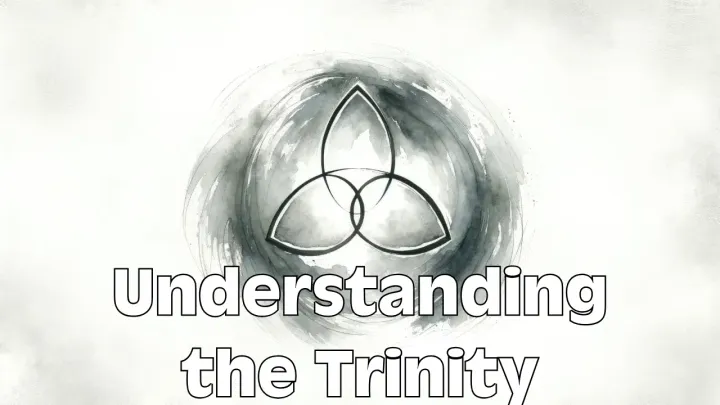The Gospel Message
Discovering the Gospel Message: Understanding the Fundamentals of Christianity. In this blog post, we explore the key components of the Gospel Message, including sin, salvation, and the resurrection of Jesus Christ. Learn how accepting Jesus as Lord and Savior and sharing the Gospel Message can lead

Why The Gospel?
<p>As I sat down to write my first blog post for the <a href="https://cyan-lark-566057.hostingersite.com/">TrinityApologetics</a> website, I was overwhelmed with excitement and the desire to create something that would benefit both believers and non-believers alike. However, I soon found myself faced with a daunting question: where do I begin? This being the first post on the website, I wanted to start with a topic that was both fundamental and crucial to the Christian faith. After some contemplation and prayer, I realized that there could be no better place to start than with the basics – the Gospel Message.</p><p>While some may question the significance of such a post, I believe that understanding and sharing the Gospel Message is essential to our faith. After all, if we do not comprehend the message that Christ came to deliver, how can we share it with others? Therefore, in this article, I will explore the intricacies of the Gospel Message and provide both a simple and a profound interpretation. Together, we will dive deep into the Word of God and develop a comprehensive understanding of the Gospel Message that is sure to inspire and enlighten.</p>
<h2>What Is The Gospel Message?</h2>
<p>Before diving into the Gospel Message, it’s important to understand what the term “gospel” means. According to the “<a href="https://www.blueletterbible.org/search/Dictionary/viewTopic.cfm?topic=ET0001531" target="_blank" rel="noreferrer noopener">Easton’s </a><a href="https://www.blueletterbible.org/search/Dictionary/viewTopic.cfm?topic=ET0001531" target="_blank" rel="noopener">Bible Dictionary</a>,” the word gospel originates from the Anglo-Saxon word “God’s spell,” which translates to “word of God” or “good news.” In the Gospel of Matthew (<a href="https://www.blueletterbible.org/esv/mat/4/23/s_933023" target="_blank" rel="noreferrer noopener">Matthew 4:23</a>), we see the term used for the first time when it refers to Jesus teaching and proclaiming the “<strong>gospel</strong> of the kingdom” while healing people in Galilee. This usage of the term implies that the Gospel Message is indeed good news. Thus, we can simply define the Gospel Message as the “Good News” of Jesus Christ, our Lord, and Savior. Understanding this basic definition will allow us to delve deeper into the message of salvation and its significance in our lives.</p><p>Despite having a basic understanding of the term “Gospel Message,” one may still question what it truly entails. At first, this question may seem daunting, but the answer is quite simple. The Gospel Message is a message of forgiveness for our sins through the sacrifice, death, and resurrection of Jesus Christ. It’s a simple message, yet profound in its significance. One of the beauties of the Gospel Message is its simplicity and accessibility to all. It’s a message that can be grasped and embraced by people from all walks of life. However, it’s important to note that while the Gospel Message may seem simple on the surface, it has significant theological implications and can be explored in much greater depth. A popular set of Bible verses that captures the essence of the Gospel Message is <a href="https://www.blueletterbible.org/esv/jhn/3/16-17/s_1000016" target="_blank" rel="noreferrer noopener">John 3:16-17</a>. These verses encapsulate the core message of the Gospel – that God loves us and that salvation comes through faith in Jesus Christ alone.</p>
<h2>A Deeper Understanding</h2>
<p>To gain a deeper and more profound understanding of the Gospel Message, there are several key components that we must consider. First, it’s crucial to comprehend why we need the Gospel Message or, more specifically, why we need Jesus Christ as our savior. Without a clear understanding of our need for salvation, the Gospel Message loses its meaning and significance. Secondly, we must have a comprehensive understanding of who Jesus Christ is. He is not just an ordinary person, but rather the Son of God, who came to Earth to save us from our sins. Thirdly, it’s essential to recognize the significance of the resurrection of Christ. This event serves as a powerful testament to the power of God and his ability to overcome even death itself. Finally, it’s crucial to understand the nature of the offer of salvation that Christ has given us. It’s a free gift that we can receive only through faith, and not through any of our own works or merit. By comprehending these key components of the Gospel Message, we can gain a deeper and more meaningful understanding of its significance in our lives.</p>
<h2>Why We Need The Gospel?</h2>
<p>To fully comprehend why we need the Gospel Message, we must understand our position before God. Despite our efforts to be good, we fall short of God’s standard, as <a href="https://www.blueletterbible.org/esv/mar/10/18/s_967018" target="_blank" rel="noreferrer noopener">Mark 10:18</a> highlights. Jesus, Himself said, “Why do you call me good? No one is good except God alone.” (<a href="https://www.blueletterbible.org/esv/mar/10/18/s_967018" target="_blank" rel="noreferrer noopener">Mark 10:18</a>). Moreover, our sinful nature separates us from God, making us His enemies as stated in <a href="https://www.blueletterbible.org/esv/rom/5/10/s_1051010" target="_blank" rel="noreferrer noopener">Romans 5:10</a>, “For if while we were enemies, we were reconciled to God by the death of his Son, much more, now that we are reconciled, shall we be saved by his life.” The gravity of sin is highlighted in <a href="https://www.blueletterbible.org/esv/rom/6/23/s_1052023" target="_blank" rel="noreferrer noopener">Romans 6:23</a>, “For the wages of sin is death, but the free gift of God is eternal life in Christ Jesus our Lord.” We must realize that without salvation through Jesus Christ, our sin condemns us to eternal death. As <a href="https://www.blueletterbible.org/esv/rev/21/8/s_1188008" target="_blank" rel="noreferrer noopener">Revelation 21:8</a> warns, “But as for the cowardly, the faithless, the detestable, as for murderers, the sexually immoral, sorcerers, idolaters, and all liars, their portion will be in the lake that burns with fire and sulfur, which is the second death.” In short, we are all deserving of the lake of fire without Jesus.</p>
<h2>Who Is Jesus?</h2>
<p>Understanding who Jesus Christ is forms a crucial part of comprehending the Gospel Message. Firstly, we must acknowledge that Jesus is both fully God and fully human, as stated in <a href="https://www.blueletterbible.org/esv/jhn/1/14/s_998014" target="_blank" rel="noreferrer noopener">John 1:14</a>, “And the Word became flesh and dwelt among us, and we have seen his glory, glory as of the only Son from the Father, full of grace and truth.” Moreover, Jesus not only is God, but He also lived a perfect and sinless life, unlike any other human or ancestor, as stated in <a href="https://www.blueletterbible.org/esv/1pe/2/22/s_1153022" target="_blank" rel="noreferrer noopener">1 Peter 2:22</a>, “He committed no sin, neither was deceit found in his mouth.” This highlights the unique nature of Jesus Christ as both fully divine and fully human, and it underscores His supreme importance as the one who can redeem us from our sins. Furthermore, Jesus Christ’s sacrifice on the cross serves as the final and ultimate atonement for our sins, as <a href="https://www.blueletterbible.org/esv/heb/10/1-18/s_1143001" target="_blank" rel="noreferrer noopener">Hebrews </a><a href="https://www.blueletterbible.org/esv/heb/10/1-18/s_1143001" target="_blank" rel="noopener">10:1-18</a> explains. It is only by understanding who Jesus is and what He has done that we can fully comprehend the power and significance of the Gospel Message.</p>
<h2>The Resurrection</h2>
<p>As previously mentioned, the resurrection of Christ is a powerful testament to the power of God, and recognizing its significance is crucial to understanding the Gospel Message. In the Bible, we see that only God has power over life and death, as demonstrated in <a href="https://www.blueletterbible.org/esv/job/1/21/s_437021" target="_blank" rel="noreferrer noopener">Job 1:21</a> when Job says, “The LORD gave, and the LORD has taken away; blessed be the name of the LORD.” Therefore, only God can resurrect life after death, which is precisely what happened when Jesus rose from the dead. The resurrection not only confirms Jesus’ claim to be God but also serves as proof of His victory over sin and death. In <a href="https://www.blueletterbible.org/esv/1co/15/17/s_1077017" target="_blank" rel="noreferrer noopener">1 Corinthians 15:17</a>, Paul writes, “And if Christ has not been raised, your faith is futile and you are still in your sins.” Thus, the resurrection is an essential aspect of the Gospel Message, for without it, there is no hope of salvation.</p>
<h2>Salvation</h2>
<p>Up to this point, we have gained a deeper understanding of the Gospel Message, but one fundamental aspect remains: salvation. It’s crucial to comprehend that salvation is a free gift and not something we can earn based on our own merits or works. This is explicitly stated in <a href="https://www.blueletterbible.org/esv/rom/6/23/s_1052023" target="_blank" rel="noreferrer noopener">Romans 6:23</a>, which explains that while the wages of sin is death, the gift of God is eternal life in Christ Jesus our Lord. <a href="https://www.blueletterbible.org/esv/eph/2/8-9/s_1099008" target="_blank" rel="noreferrer noopener">Ephesians 2:8-9</a> also highlights this point by emphasizing that we are saved by grace through faith, and it’s not our own doing. This way, no one can boast about their salvation being the result of their own works. Additionally, <a href="https://www.blueletterbible.org/esv/rom/10/9/s_1056009" target="_blank" rel="noreferrer noopener">Romans 10:9</a> underscores the notion that salvation is a gift from God, and it’s attained by confessing with our mouth that Jesus is Lord and believing in our heart that God raised him from the dead. It’s crucial to understand that we cannot earn salvation, but it’s freely given to us by God’s grace.</p>
<h2>Sharing The Gospel</h2>
<p>Now that we have a basic understanding of what the Gospel Message is, it’s time to consider how we can respond to this great message. First and foremost, it is vital that we accept Jesus as our Lord and Savior. It is only through Christ that we may live and inherit eternal life, as <a href="https://www.blueletterbible.org/esv/jhn/14/6/s_1011006" target="_blank" rel="noreferrer noopener">John 14:6</a> states, “Jesus said to him, ‘I am the way, and the truth, and the life. No one comes to the Father except through me.'” Once we have accepted Christ, it’s important to share the Gospel Message with others. We are called to spread this message to the nations, as <a href="https://www.blueletterbible.org/esv/mat/28/16-20/s_957016" target="_blank" rel="noreferrer noopener">Matthew 28:16–20</a> tells us. Sharing the Gospel is an act of love, and if we truly love our neighbor, we cannot simply let them stumble into Hell without at least trying to warn them. As it says in <a href="https://www.blueletterbible.org/esv/1pe/3/15/s_1154015" target="_blank" rel="noreferrer noopener">1 Peter 3:15</a>, “but in your hearts honor Christ the Lord as holy, always being prepared to make a defense to anyone who asks you for a reason for the hope that is in you; yet do it with gentleness and respect” Let us then share the Gospel with boldness and love, always ready to give an answer for the hope that is within us.</p>
<h2>Conclusion</h2>
<p>In conclusion, the Gospel Message is a foundation of the Christian faith, and it is a message of hope, love, and redemption. It teaches us that we are all sinners in need of a Savior and that Jesus Christ is that Savior. Through his death and resurrection, we have been given the gift of eternal life, not by our own merit but by the grace of God. It is our responsibility to accept this gift and to share this message with others. We must strive to live a life that reflects the love and grace that has been shown to us through Jesus Christ. May we never forget the power of the Gospel Message and the impact it has on our lives and the world around us.</p>


